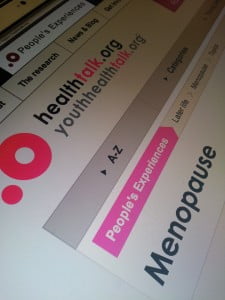In the first of our series of guest blogs about the menopause and health, Jenny Hislop, a Senior Qualitative Researcher in the Health Experiences Research Group (HERG) at the University of Oxford, talks about her research on the menopause and collecting women’s stories for the www.healthtalk.org website.
Page updated 25 April 2022 with links to resources at the end of the blog.

A few years ago I had the privilege of interviewing 46 women throughout the UK about their experiences of the menopause for the award-winning website www.healthtalk.org What impressed me most was their willingness to talk openly about the menopause and its impact on their everyday lives. And it takes courage to do this. We live in a society where we tend to build a wall of silence around personal matters like the menopause – it’s something we keep hidden and as a result no one really knows what to expect. And I think this is one of the key strengths of the menopause site: it brings the menopause into the open and lifts the lid on a rite of passage which all women will go through. The women on the site bring the menopause to life by telling it like it is. A hot flush is no longer a ‘vasomotor instability’ as one website helpfully describes it, but ‘a creeping sensation’ which rises from the feet through the whole body; an ‘explosion’ in the chest and neck which goes ‘right up to your brow’; ‘a thermometer going up and down’. One woman compared the warmth she feels to ‘going under a sun lamp, another felt as if someone had opened a ‘little trap door’ in her stomach and put a hot coal in.
The menopause can make women’s working lives difficult
Although it’s true that some women ‘sail through the menopause’, for others it can be a difficult and uncomfortable time. At work women face particular challenges. It’s not easy for women like Maria, working on the checkout at a supermarket while sweating profusely and being the target of ‘menopause’ jokes from workmates. Or, for women in the army like Barbara, having to march eight miles with a pack on her back and cope with irregular periods while out in the field. It’s not fun either for women like Joyce having to run an organisation and give presentations when her memory deserts her and she feels as if she’s ‘lost the chip’ out of her brain. In a youth focused society in which ageism is alive and kicking, the menopause may coincide with getting older. Menopausal symptoms alongside wrinkles, grey hair, and putting on weight can make it difficult to give the ‘right’ impression in the workplace and in some industries women rightly fear their jobs may be on the line. With 63% of women aged 50-64 in the workplace (ONS 2013), the menopause is an occupational health issue which can no longer be ignored.
Partners need to understand the menopause too
But it’s not just at work that women can face difficulties. Relationships can also suffer. Sharing a bed with a sweaty menopausal woman who spends half the night tossing and turning and throwing the covers off to get cool is no picnic for either the woman or her partner. Lack of sleep as well as loss of interest in sex can add to tensions in a relationship. Women talk about wanting cuddles, support and reassurance from their partner. But it’s pretty difficult for partners to feel loving and supportive when they’re living with the mood swings, irritability and anxiety of their menopausal partners. Good communication and being prepared to learn about the menopause can make a huge difference, but it’s important that women start talking more frankly about their symptoms and needs rather than trying to protect their partner from the reality of how they’re feeling. We hope the www.healthtalk.org menopause site will be looked at just as avidly by men as by women.
The menopause is an individual experience
Of course the menopause is not all doom and gloom. Many women see it as an opportunity to reassess their lifestyle, exercise more, eat better and undertake new career paths and challenges. It can be a time of moving on and embracing change. And never having to wheel your trolley down the sanitary products aisle at the supermarket can certainly have its advantages.
The menopause is an individual experience so what we’ve tried to do on the site is to cover as wide a range of experiences as possible. The www.healthtalk.org menopause site comprises 23 topic summaries on areas such as ‘what is the menopause?; early menopause; symptoms such as irregular periods, hot flushes and sweats and emotional symptoms; what women do to manage symptoms including HRT, alternative therapies and self-help strategies. We also look at how the menopause impacts on everyday life, for example work, relationships, sleep and getting older; and include advice for women, their partners and health professionals. These topic summaries are illustrated by over 250 video, audio and written clips of women’s experiences which bring the menopause alive. As one woman said: ‘it’s like talking to a good friend’.
Resources on menopause
The Editors have added these in April 2022. With thanks to @drhannahshort, GP Specialist in Menopause & Premenstrual Disorders, for her suggestions.
- You can find our other blogs on menopause here.
- Balance: Founded by Dr Louise Newson, “a GP and Menopause Specialist who works to increase awareness and knowledge of the perimenopause and menopause, and campaigns for better menopause care for all women”.
- British Menopause Society: tools for clinicians and Menopause Care Resources Toolkit
- Daisy Network, a charity providing information and support to women with Premature Ovarian Insufficiency, also known as Premature Menopause.
- European Society of Human Reproduction and Embryology – Guideline on the management of premature ovarian insufficiency.
- Global Menopause Inclusion Collective
- Healthtalk – Menopause. Here you can see videos of women in the UK talking about their menopause experiences.
- International AssociationA relationship between two characteristics, such that as one changes, the other changes in a predictable way. For example, statistics demonstrate that there is an association between smoking and lung cancer. In a positive association, one quantity increases as the other one increases (as with smoking and lung cancer). In a negative association, an increase in one quantity corresponds to a decrease in the other. Association does not necessarily mean that one thing causes the other. for Premenstrual Disorders: Surgery and surgical menopause for premenstrual disorders.
- Rock My Menopause (created on behalf of the Primary Care Women’s Health Forum)
- NICE guideline – Menopause: diagnosis and management.
- NHS – Menopause
- Women’s Health Concern factsheets
Please note, we cannot give specific medical advice and do not publish comments that link to individual pages requesting donations or to commercial sites, or appear to endorse commercial products. We welcome diverse views and encourage discussion but we ask that comments are respectful and reserve the right to not publish any we consider offensive. Cochrane UK does not fact check – or endorse – readers’ comments, including any treatments mentioned.


